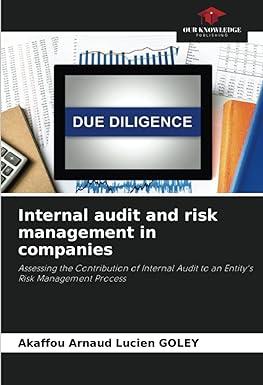Question
1. Common-size financial statements means___________________. a) there is nothing outside the ordinary b) scaling the dollar amounts within the financial statements to percentage terms c)
1. Common-size financial statements means___________________.
a) there is nothing outside the ordinary
b) scaling the dollar amounts within the financial statements to percentage terms
c) all information must fit on one page
d) nothing, that is not a term used with financial statements or analysis
Question 2.2. Vertical analysis of a financial statement involves_______________.
a) analyzing one period of financial data to another
b) setting total assets as the base (100%) figure
c) setting net income as the base (100%) figure
d) measuring each expense category as a percentage of sales
Question 3.3. Horizontal analysis of a financial statement involves______________.
a) analyzing one period of financial data to another
b) setting total assets as the base (100%) figure
c) all of the items listed here
d) analyzing trends
Question 4.4. Which of the following would not be considered a liquidity ratio?
a) Times interest earned
b) Quick ratio
c) Working capital
d) Current ratio
Question 5.5. Which of the following would not be considered a debt service ratio?
a) Times interest earned
b) Debt to total assets
c) Debt to equity
d) All of these are considered debt service ratios
Question 6.6. Turnover analysis indicates______________.
a) how a firm turns over a new leaf
b) a firms ability to make money
c) a firms ability to collect receivables
d) expenses associated with operating the firms core business functions
Question 7.7. Gross profit margin_________________.
a) examines profitability in relation to sales
b) examines profitability in relation to cost of goods sold
c) examines profitability in relation to total assets employed
d) examines profitability in relation to debt undertaken
Question 8.8. Earnings per share (EPS) is considered to be________________.
a) a debt service ratio
b) a liquidity ratio
c) a profitability ratio
d) an activity ratio
Question 9.9. Dividend yield is determined by___________________________.
a) dividing assets by liabilities
b) dividing the annual cash dividend by the market price per share of the company stock
c) dividing the market price per share of the company stock by the annual cash dividend
d) dividing liabilities by assets
Question 10.10. Book value per share___________________.
a) measures the value of an asset less depreciation
b) measures the firms ability to service debt
c) measures the sales value of the company to a potential purchaser
d) measures the amount of stockholders equity represented by each share of common stock
Step by Step Solution
There are 3 Steps involved in it
Step: 1

Get Instant Access to Expert-Tailored Solutions
See step-by-step solutions with expert insights and AI powered tools for academic success
Step: 2

Step: 3

Ace Your Homework with AI
Get the answers you need in no time with our AI-driven, step-by-step assistance
Get Started


